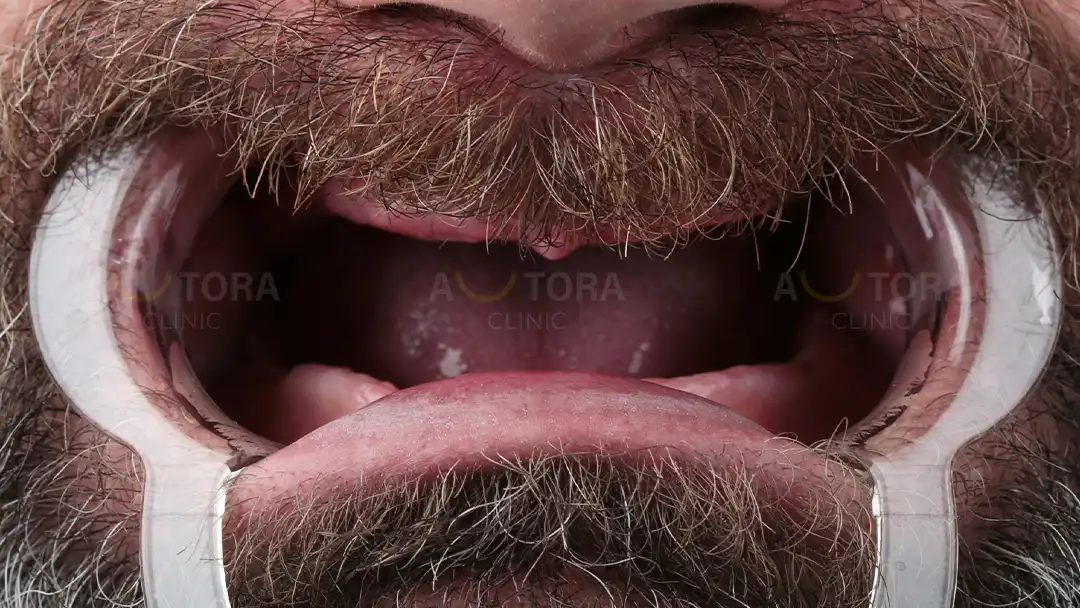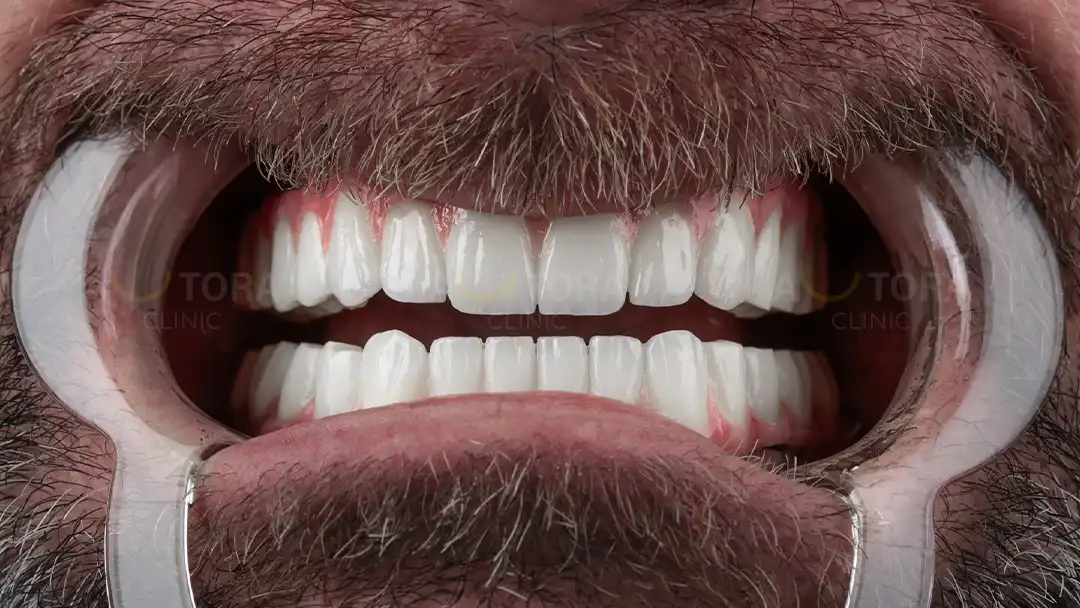Dental implant
Dental implant in Turkey 2025
Discover everything about dental implants in Turkey: types, step-by-step procedure, recovery, aftercare, benefits, side effects, All-on-4 & All-on-6 solutions, top brands at Autora Clinic, costs, and before & after results.
Dental implant Before & After
Table of contents:
- What is a dental implant?
- What are the most common types of dental implant?
- Are you the right candidate for a dental implant procedure?
- Pre-op Dental Implant Instructions
- Dental implant process step by step. How is it done?
- Dental implant recovery. What to expect after dental implant surgery?
- Dental implant aftercare
- What are the dental implant benefits?
- Are there any dental implant side effects?
- What are All on 4 & 6 Dental Implants - Full mouth teeth?
- Best dental implant brands at Autora clinic in Turkey
- How much do dental implants cost in Turkey?
- Dental implant before and after
What is a dental implant?
Dental implant surgery is a procedure that involves removing tooth roots and replacing them with metal posts, and the replacement of lost teeth with artificial ones. Although not real teeth, dental implants are designed to mimic both the appearance and function of natural teeth closely.
When dentures or bridgework do not fit well for an individual, this surgical option can be one alternative choice; likewise when lack of natural tooth roots prevents building usual tooth replacements on dentures or bridgework it can be considered as an appropriate solution to take up.
What are the most common types of dental implant procedures?
There are three primary classifications of dental implant procedures based on the number of teeth being substituted:
-
Single tooth implant
In a single-tooth implant, only one missing tooth is involved. Here, a solitary implant is positioned by the dentist and then affixed with a new tooth or crown.
-
Multiple-tooth implant
For multiple-tooth implantation, it is used in place of many lost teeth. The dentist will place several implants in specific locations and fasten artificial teeth made to fit those exact spots.
-
Full mouth dental implant
Consider a full-mouth implant: it is the best choice when you have lost all of your teeth. All-on-4 or All-on-6 are procedures where only 4 or 6 implants are used to sustain a complete set of new teeth.
Read More: Full Mouth Dental Implants Turkey
Are you the right candidate for a dental implant procedure?
Typically, you might be the right candidate for a dental implant procedure if you have:
-
Missing teeth: One or more missing teeth are typically the main reason to consider dental implants.
-
Mature jawbone: Your jawbone should be well developed as it usually completes growth by adulthood.
-
Sufficient bone density: There needs to be enough healthy jawbone present that can hold the implants securely; bone grafting may be an option if this is not the case.
-
Proper gum health: Healthy gums, which means no gum disease, are also very important for a successful implant.
-
Physical condition: You should not have any systemic conditions — or take medications that could compromise your overall health and hamper bone growth— which could affect the healing of the surgical site.
-
Not fitting dentures: If you are unable to wear a denture (or unwilling because it is uncomfortable) then implants might be indicated for you.
-
Speech improvement by implants: If you are having difficulties in speaking due to missing teeth, placement of dental implants may improve speech clarity.
Pre-op Dental Implant Instructions. How to prepare for your dental implant procedure?
Some important instructions to follow before undergoing a dental implant surgery are:
-
Fasting
Always follow your dentist or oral surgeon's guidelines on what to eat and drink before the operation. You'll usually be required to not consume any food or liquids for several hours prior to the surgery.
-
Clothing
Dress comfortably in loose clothes so you can move easily; this will help you feel more at ease both during and after the procedure.
-
Oral health
Before surgery, you may not do anything but clean your mouth by brushing your teeth as you normally would.
-
Medications
Before surgery, make sure you take any pre-operative medications as directed by your dentist or surgeon. Also, it is advisable to have a list of allergies, medications or medical conditions that may be relevant to the procedure.
-
Smoking
It is also recommended that you refrain from smoking for at least 1 week. It might negatively affect your dental implant recovery.
-
Alcohol
It is advisable to refrain from consuming too much alcohol: prior to oral implant surgery. Alcohol can hinder the anesthesia process, as well as slowing down wound healing and possible increased effects on bleeding and infection risks.
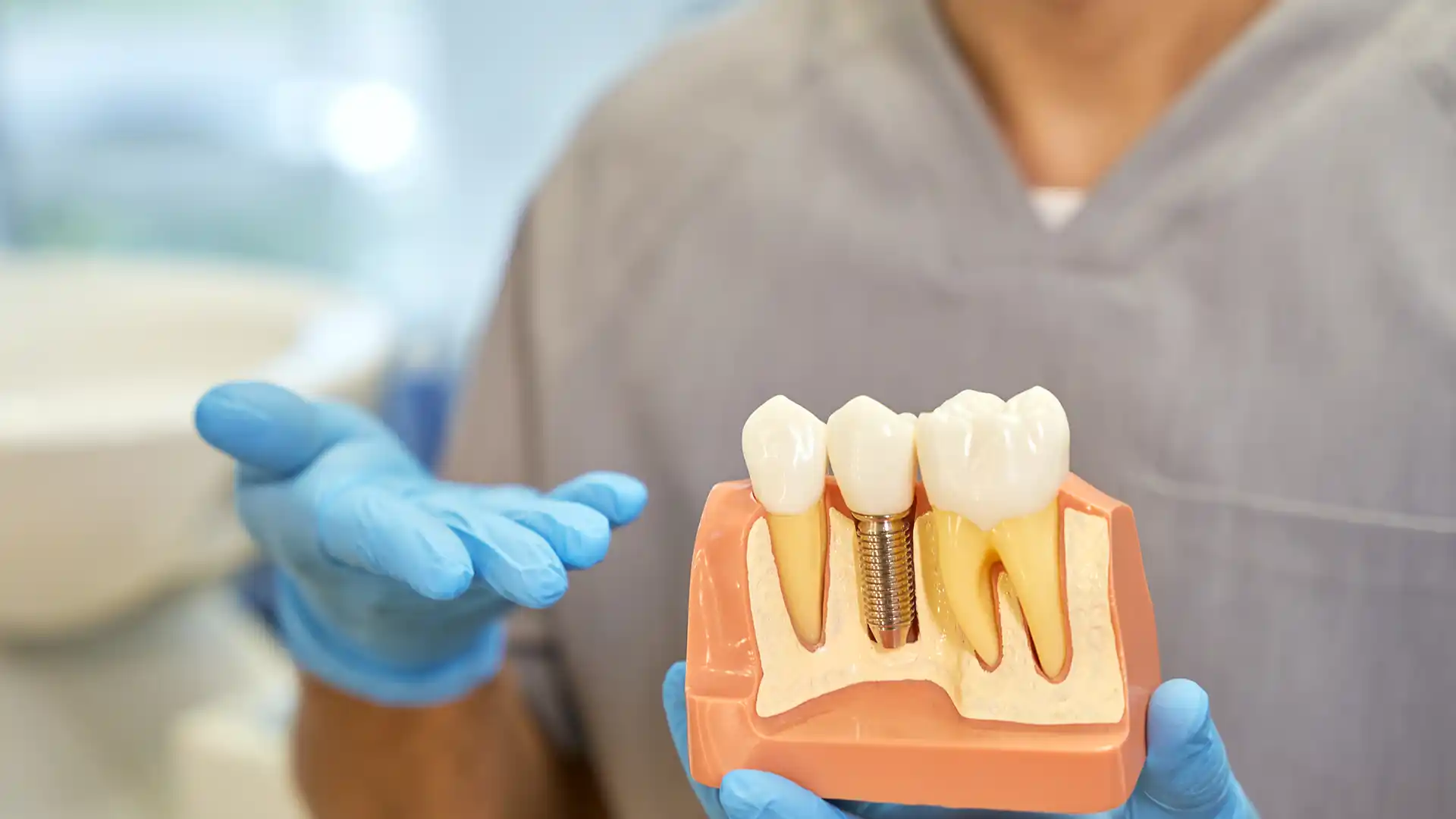
Dental implant process step by step. How are dental implant Turkey done?
Let’s see how a dental implant procedure done step by step:
Preparing for Dental Implants
A thorough consultation will be carried out prior to your implant procedure. This typically includes:
-
Examination of your teeth
X-rays, 3D scans, and occasionally dental models will be taken to evaluate your condition.
-
Medical history review
Make sure to inform your dentist about any medical issues or drugs you are on. This helps in their decision on whether antibiotics are necessary to avert infections.
-
Treatment plan
Your treatment plan will be developed by you and your dentist. It will be tailored to your individual needs, taking into account details such as the number of teeth that are missing, as well as the condition of your jawbone.
Dental Implant procedure
Many steps are typically involved in the dental implant operation:
-
Anesthesia
Local anesthesia is used during the surgery to control pain.
-
Implant Placement
During this stage, a cut is made in your gum tissue to expose the bone. Small holes are drilled for the implant post, which are placed deep into the jawbone as artificial tooth roots.
-
Temporary denture
Gap filling is done using a temporary denture while waiting for the implant to heal.
-
Abutment placement
Later on, another minor surgical procedure may be necessary to place an abutment which serves as the link between the implant and artificial tooth (crown).
-
Crown Placement
When the implant area has completely healed, molds of your mouth are made to produce a permanent crown specially made for you that resembles and works like a real tooth. This custom crown is then firmly fixed onto the abutment.
Dental implant recovery. What to expect after dental implant surgery?
Dental implant healing period is different for everyone but people usually go back to their everyday tasks within 3 days. Here's what you might face during the beginning of the Dental implant healing stages:
There is nothing major about discomfort. But for a short period, expect swelling and bruising around the implant site. Sometimes there may be some pain which will be localized around the same area.
Your dentist or surgeon will probably give you a prescription for painkillers and antibiotics; make sure you take them as directed.
Choosing to eat soft foods will let your gums heal peacefully and not be interfered with. Your dentist will instruct you on when you can progressively begin to include more solid foods back into your diet.
Any pain or swelling that you may experience will naturally decrease as time goes by. But if you have persistent problems without feeling relieved from the pain, make sure to reach out back to your surgeon for further assistance.
Read More: Dental implant healing stages
Dental implant aftercare
Once the dental implant surgery has been completed, these are some of the main practices you need to take into account after the fact in order to achieve ideal healing and success over the long term:
-
Refrain from consuming alcohol for 24 hours following the surgery as this will promote faster healing.
-
Wait 24 hours post-surgery before brushing the implant site directly; soft-bristled brush and gentle brushing after that time is essential for good oral hygiene.
-
Brush your teeth at least twice a day for two minutes each using a soft-bristled toothbrush and fluoride toothpaste.
-
Remember to floss daily since it helps in removing plaque and food particles from in between the teeth which brushing cannot reach.
-
Returning back to your work on the following day after your treatment can be possible in most instances.
-
Regularly use a chlorhexidine mouthwash as prescribed by your dentist so that you can keep the area around the implant clean and also prevent plaque accumulation.
-
Keep away from hard foods such as ice and candy for some time to avoid harm to the implant or natural teeth.
-
Stay away from tobacco and lots of caffeine if you wish to preserve the appearance of your false teeth without any stains.
-
It is best to quit smoking entirely for the perfect healing process and sustained health of the implants in the future.
-
Sustainability for a long time: In the same way, keeping natural teeth healthy involves consistent and proper oral hygiene is vital also to keep implant health in place over time. This entails regular cleaning up which comprises brushing, flossing, and professional dental cleanings.
What are the dental implant benefits?
There are many advantages to dental implants in replacing missing teeth. Let me tell you more about how they can make your life better:
-
Durability and Strong
Dental implants are very strong and if taken care of well, they can serve you for a lifetime.
-
Ensure Healthy Jawbone
Implants help keep your jawbone healthy as they promote the growth of the bone; this is unlike dentures which lead to bone loss that affects the structure of your face.
-
Natural-looking
They provide a stunning and natural smile that you will feel confident about— without any noticeable difference!
-
Preservation of Surrounding Teeth
In contrast to bridges which involve the modification of nearby healthy teeth, implants do not compromise the strength and integrity of surrounding teeth.
-
Reviving Facial Features
The absence of teeth can lead to changes in facial contours which are usually unpleasant. Implants take their place between existing teeth, thereby restoring those contours and hence your natural face aesthetics.
-
Enhanced Speech and Chewing
Dental implants work similar to natural teeth allowing you to talk properly and chew comfortably with no restrictions.
-
Enhanced Eating Experience
Rediscover your ability to bite into a wider range of tasty foods that you may have missed before, as implants restore your natural bite force.
-
Positive Impact on Daily Living
Achieving a full set of healthy teeth enables one to experience an immense sense of confidence which leads to improved quality of life overall.
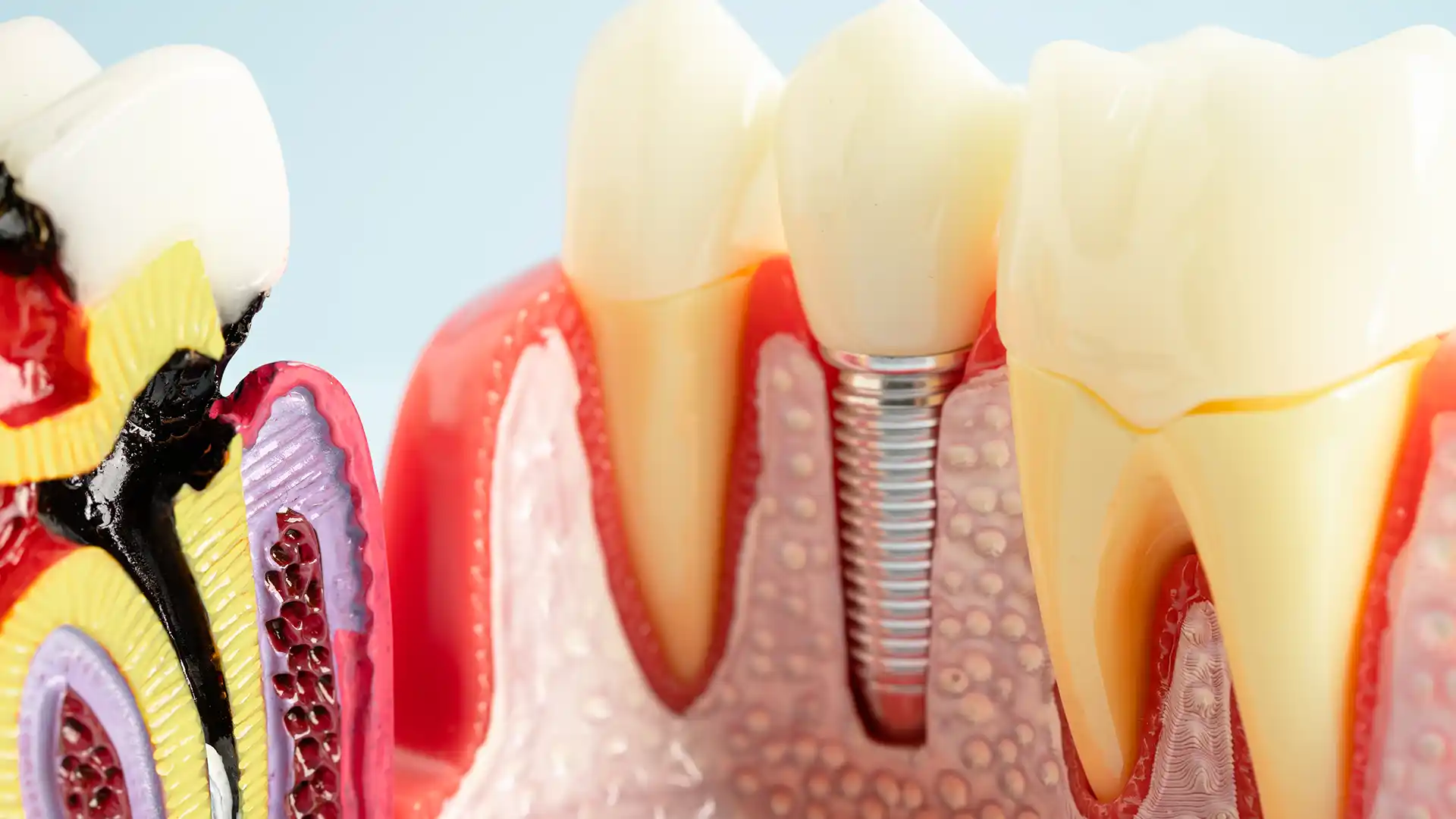
Are there any dental implant side effects?
Although dental implant surgery promises long-term advantages, it is common to undergo transient side effects while healing.
-
Pain: The discomfort you may face after the procedure can vary from person to person. In general, your dentist will suggest over-the-counter painkillers such as paracetamol or ibuprofen to help alleviate any pain you might be feeling.
-
Swelling and Bruising: It is frequent for there to be swelling and bruising around the implant site. An effective way to reduce them is by applying ice packs to the area— 10 minutes on, 10 minutes off, within the initial 6 hours post-operation.
-
Bleeding: There might be minimal bleeding. In such a case, take a clean tissue and roll it up firmly then apply pressure directly to the bleeding spot by biting down on it for not less than thirty minutes.
What are All on 4 & 6 Dental Implants - Full mouth dental implants Turkey ?
All-on-4 and All-on-6 dental implants are two strategies that exist for the replacement of all teeth in either the upper or lower jaw with a fixed bridge.
The All-on-4 uses four carefully positioned implants; however, the All-on-6 utilizes six implants which offer more stability.
Both are fixed alternatives which means no more removable dentures. This choice enhances stability and function while possibly having a better aesthetic outcome.
Choosing Between Them: Your dentist will advise you based on your jawbone condition plus what you need.
Read More: All on 6 dental implants in Turkey
Best dental implant brands at Autora clinic in Turkey
At Autora clinic, we are dedicated to making sure that our patients have the possibility of using the finest dental implants that can be found in the whole world. We realize that some patients have certain brand preferences and we are pleased to comply with those requests provided the chosen brand is globally acknowledged for its outstanding quality.
Although we can acquire and make use of any well-known brand of implant, we concentrate on four major brands from four countries with a distinction in their quality and innovation.
-
Swiss: Straumann
-
Swedish: Nobel Biocare
-
American: HIOSSEN
-
German: Biotec
Read More: Best dental implant brands in the world
Our highly trained dental specialists will meticulously evaluate your specific needs and desires in order to identify the perfect implant for you.
We will take into account details like the density of your jawbone, your history with oral health, and what you hope to achieve in terms of appearance— all aimed at providing you with the best quality implant that suits your individual needs in a unique way.
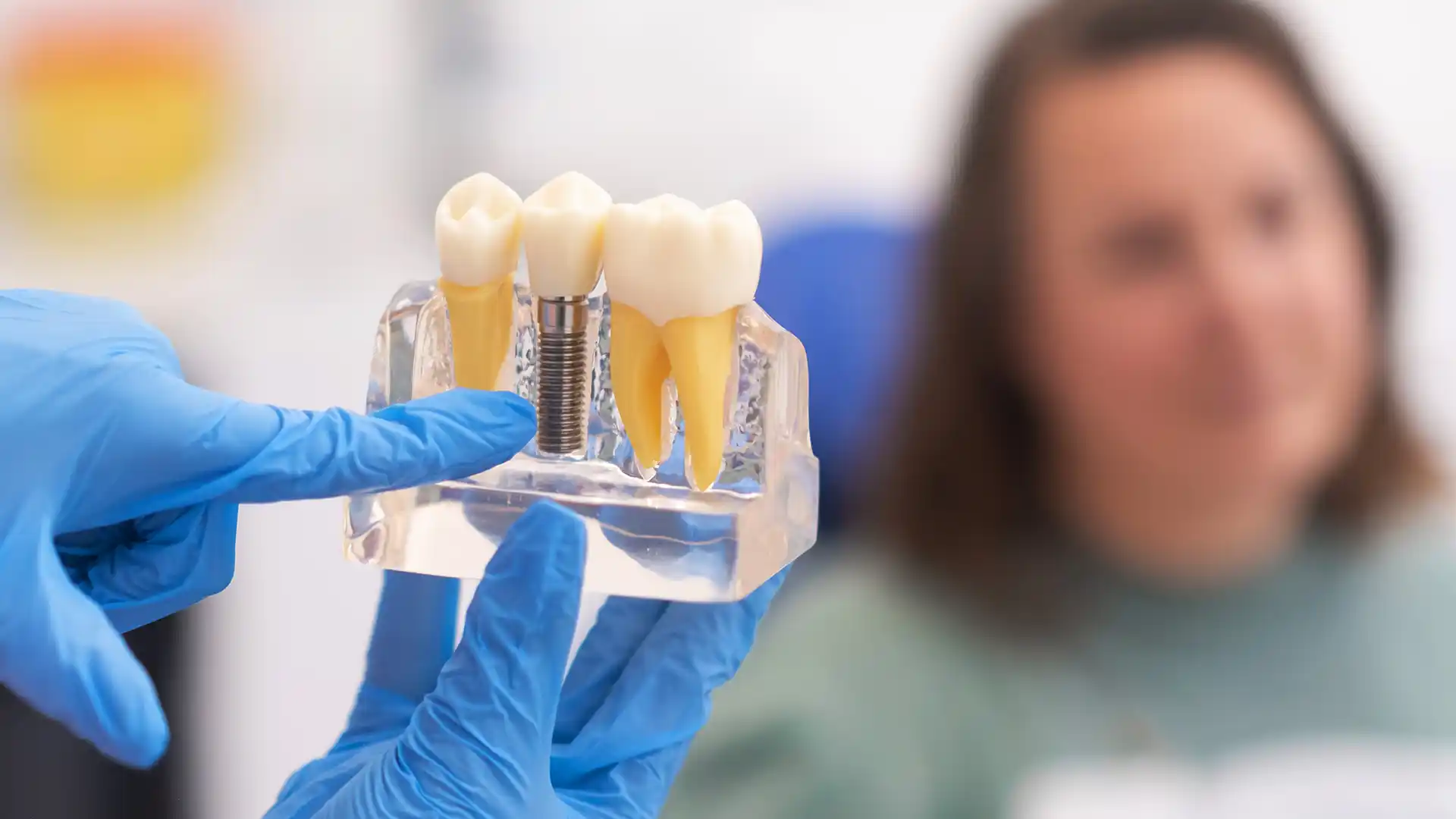
Read More: Is it safe to have dental implants in Turkey?
How much do dental implants cost in Turkey?
At Autora clinic, Dental implant price in Turkey range from $400-$800 per implant. You can also have a look at the best dental implant brands in Turkey cost in both dollars and Euros used at our clinic:
Turkey dental implants prices
|
Implant Brand |
USD Price |
EUR Price |
|
Straumann |
$1150.00 |
€1000.00 |
|
Nobel Biocare |
$950.00 |
€850.00 |
|
HIOSSEN |
$600.00 |
€555.00 |
|
Biotec |
$400.00 |
€370.00 |
Read More:Dental Implant Cost in Turkey
Moreover, you can check full mouth dental implants turkey price in dollars and euros which adopted by Autora clinic Istanbul:
Full mouth dental implants cost in Turkey
|
Procedure |
USD Price Range |
EUR Price Range |
|
All-on-4 Dental Implant |
$5,000 - $6,000 |
€4,620 - €5,545 |
|
All-on-6 Dental Implant |
$6,000 - $7,000 |
€5,545 - €6,470 |
Sources:
- https://www.mayoclinic.org/tests-procedures/dental-implant-surgery/about/pac-20384622
- https://www.webmd.com/oral-health/types-dental-implants
- https://www.webmd.com/oral-health/dental-implants
- https://www.guysandstthomas.nhs.uk/health-information/dental-implants/after-having-dental-implant
- https://www.ncbi.nlm.nih.gov/pmc/articles/PMC3894084/
- https://www.healthline.com/health/dental-and-oral-health/benefits-of-dental-implants#benefits
Got Questions? We’ve Got Answers
Explore the most asked questions and get quick solutions
Fill it out to get your free consultation
Innovation & Precision In Every Implant
We use only reputable, high-quality implants designed for long-term durability
BioTec Dental Implants


Hiossen Dental Implants


Straumann Dental Implants


Nobel Biocare Dental Implants


MegaGen Dental Implants



